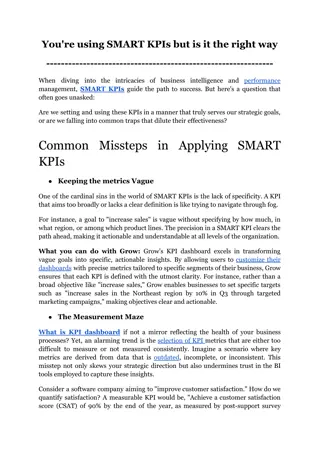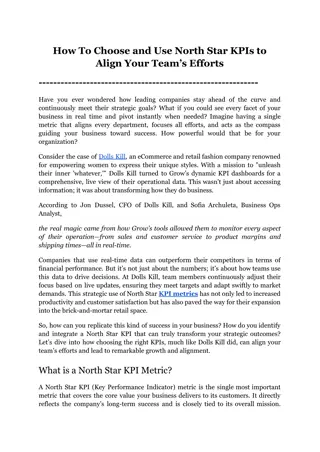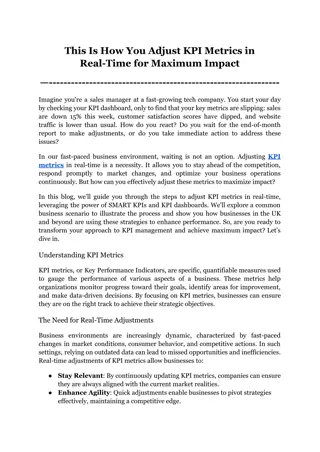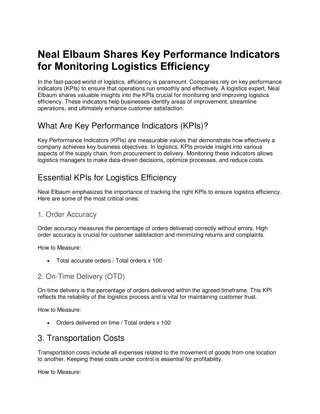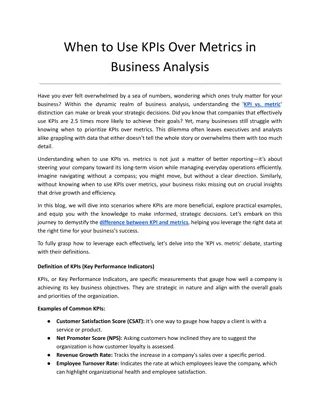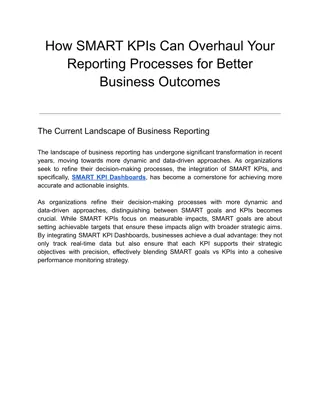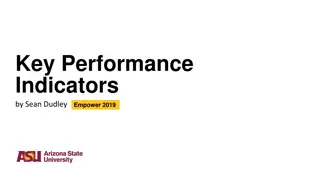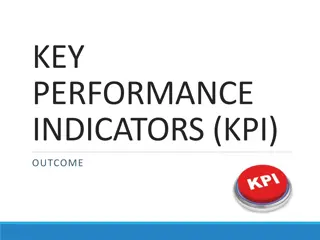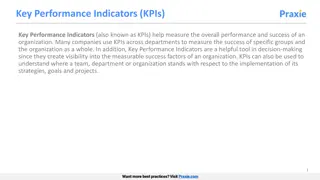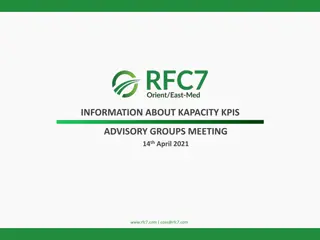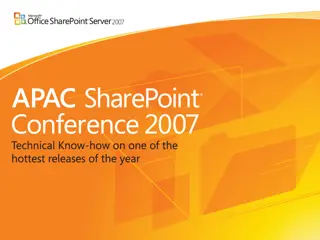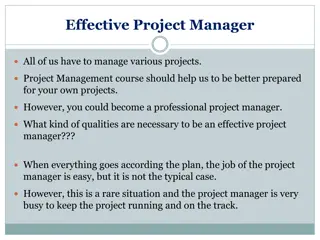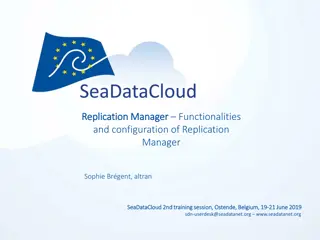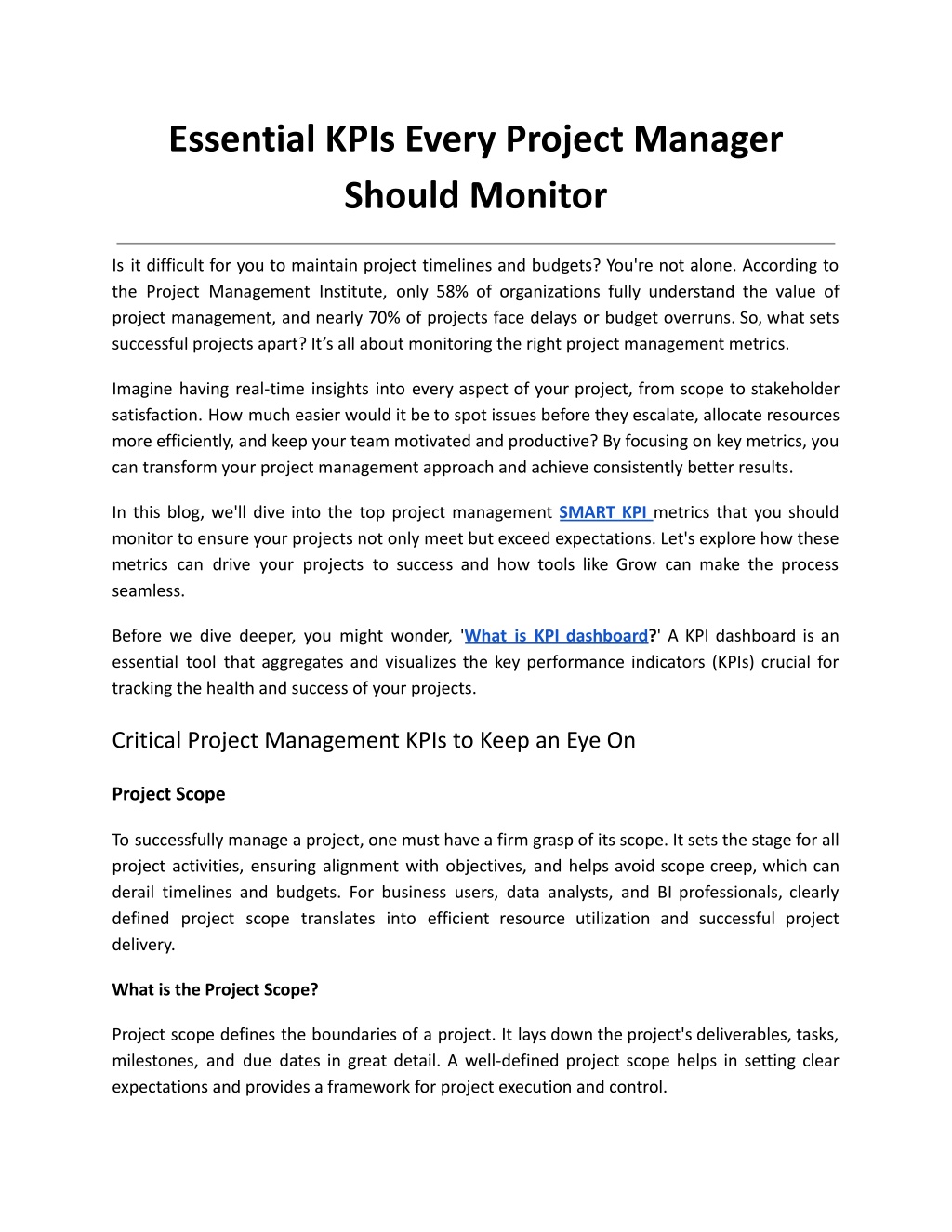
Essential KPIs Every Project Manager Should Monitor
To ensure that the project stays successful and gets the necessary limelight in the pipeline, it is crucial to monitor the appropriate project management metrics. Scope, time, money, quality, and stakeholder satisfaction are some of the most importan
Download Presentation

Please find below an Image/Link to download the presentation.
The content on the website is provided AS IS for your information and personal use only. It may not be sold, licensed, or shared on other websites without obtaining consent from the author. Download presentation by click this link. If you encounter any issues during the download, it is possible that the publisher has removed the file from their server.
E N D
Presentation Transcript
Essential KPIs Every Project Manager Should Monitor Is it difficult for you to maintain project timelines and budgets? You're not alone. According to the Project Management Institute, only 58% of organizations fully understand the value of project management, and nearly 70% of projects face delays or budget overruns. So, what sets successful projects apart? It s all about monitoring the right project management metrics. Imagine having real-time insights into every aspect of your project, from scope to stakeholder satisfaction. How much easier would it be to spot issues before they escalate, allocate resources more efficiently, and keep your team motivated and productive? By focusing on key metrics, you can transform your project management approach and achieve consistently better results. In this blog, we'll dive into the top project management SMART KPI metrics that you should monitor to ensure your projects not only meet but exceed expectations. Let's explore how these metrics can drive your projects to success and how tools like Grow can make the process seamless. Before we dive deeper, you might wonder, 'What is KPI dashboard?' A KPI dashboard is an essential tool that aggregates and visualizes the key performance indicators (KPIs) crucial for tracking the health and success of your projects. Critical Project Management KPIs to Keep an Eye On Project Scope To successfully manage a project, one must have a firm grasp of its scope. It sets the stage for all project activities, ensuring alignment with objectives, and helps avoid scope creep, which can derail timelines and budgets. For business users, data analysts, and BI professionals, clearly defined project scope translates into efficient resource utilization and successful project delivery. What is the Project Scope? Project scope defines the boundaries of a project. It lays down the project's deliverables, tasks, milestones, and due dates in great detail. A well-defined project scope helps in setting clear expectations and provides a framework for project execution and control.
Key Components of Project Scope: Objectives: Clear, specific goals that the project aims to achieve. Deliverables: Tangible or intangible products or services produced by the project. Tasks: Detailed activities that need to be performed to achieve the deliverables. Milestones: Key points or achievements within the project timeline that indicate progress. Deadlines: Specific dates by which tasks and deliverables need to be completed. To accurately measure and manage these components, SMART KPIs play a crucial role. But what exactly are SMART KPIs? They are Specific, Measurable, Achievable, Relevant, and Time-bound indicators that help ensure your project's scope is tightly controlled and on target. Importance of Defining Project Scope A clearly defined project scope ensures that all stakeholders are aligned on what the project will deliver. This alignment is crucial for avoiding misunderstandings and ensuring that the project stays on track. Additionally, a well-defined scope helps in resource planning and allocation, minimizing waste and optimizing efficiency. Monitoring Project Scope with KPI Metrics To ensure that the project scope is maintained, it s essential to monitor it using KPI metrics. Key Performance Indicators (KPIs) are measurable values that indicate how effectively project goals are being met. Monitoring these metrics through a KPI dashboard provides real-time insights and helps in making informed decisions. Key KPI Metrics for Monitoring Project Scope: 1. Scope Creep: Measures the extent of deviation from the original project scope. Frequent changes or additions to the project can indicate poor scope management. 2. Completion Rate: Tracks the percentage of completed tasks against planned tasks, providing a clear view of project progress. 3. Milestone Achievement: Monitors the timely completion of project milestones, ensuring that the project remains on schedule. 4. Resource Utilization: Evaluates the efficiency of resource usage, helping to identify any potential overuse or underuse of resources. Examples of SMART KPIs: Specific: "Complete the design phase by September 30th."
Measurable: "Get 90% of your tasks done before the end of the third quarter." Achievable: "Scope creep should not exceed 5% of the overall project scope." Relevant: "Keep the utilization rate of resources over 80% all through the project." Time-bound: "Reach the second milestone by the end of the first month." Time Tracking and Scheduling Effective project management relies heavily on time tracking and scheduling. They ensure that projects are completed on time and within budget, while also maximizing productivity and resource utilization. For business users, data analysts, and BI professionals, mastering these elements is key to project success. Importance of Time Tracking and Scheduling Time tracking involves monitoring the amount of time spent on various tasks and activities within a project. Scheduling, on the other hand, is the process of planning and organizing tasks to ensure they are completed in a timely manner. Together, these practices help in managing deadlines, allocating resources efficiently, and maintaining overall project health. Effective scheduling and time management are crucial for project success, and a KPI dashboard plays a key role here. It provides a comprehensive overview of time-related metrics, helping teams stay on schedule. Key Benefits: Enhanced Productivity: By accurately tracking time, teams can identify and eliminate inefficiencies, leading to increased productivity. Improved Accountability: Time tracking holds team members accountable for their work, fostering a culture of responsibility. Better Resource Management: Effective scheduling ensures optimal use of resources, reducing downtime and over-allocation. Timely Project Completion: Monitoring time and adhering to schedules helps in meeting project deadlines, thereby improving client satisfaction. Monitoring Time Tracking and Scheduling with KPI Metrics KPI metrics play a vital role in monitoring time tracking and scheduling. These measurable values provide insights into how well project activities are being managed, helping teams to stay on track and make necessary adjustments. Key KPI Metrics for Time Tracking and Scheduling:
1. Actual Time vs. Planned Time: Measures the difference between the time planned for tasks and the actual time taken. Significant variances can indicate potential issues that need addressing. 2. Task Completion Rate: Tracks the percentage of tasks completed on time, providing a clear view of project progress. 3. Resource Utilization Rate: Evaluates how effectively resources are being used, ensuring that there is no overuse or underuse. 4. Schedule Adherence: Monitors how well the project is sticking to its planned schedule, highlighting any delays or early completions. Cost Management Cost management is a crucial aspect of project management that involves planning, estimating, budgeting, and controlling costs to ensure that a project can be completed within the approved budget. Effective cost management helps businesses maximize profitability, improve resource allocation, and enhance decision-making. Importance of Cost Management Cost management ensures that a project is delivered within its financial constraints. It involves a series of processes that provide a framework for planning and controlling project costs. For business users, data analysts, and BI professionals, effective cost management is essential for achieving financial objectives and maintaining project viability. Key Benefits: Budget Control: Ensures that spending does not exceed the allocated budget, avoiding financial overruns. Resource Optimization: Helps in allocating resources efficiently to minimize waste and enhance productivity. Risk Mitigation: Identifies potential financial risks early, allowing for proactive management. Improved Decision-Making: Provides financial data that informs strategic decisions and project adjustments. Monitoring Cost Management with KPI Metrics KPI metrics are vital tools for monitoring and controlling project costs. They provide measurable values that indicate how well cost management processes are performing, enabling project managers to identify issues and make necessary adjustments.
Key KPI Metrics for Cost Management: Cost management requires meticulous monitoring, which is efficiently handled by a KPI dashboard. This tool ensures that all cost-related data are updated and accessible, allowing for immediate budget adjustments and financial planning. 1. Budget Variance: Measures the difference between the planned budget and actual spending. A high variance can signal overspending or underspending. 2. Cost Performance Index (CPI): Evaluates cost efficiency by comparing the value of work performed to the actual cost. Management of costs is considered efficient when the CPI is larger than 1. 3. Estimate at Completion (EAC): Projects the total cost of the project based on current performance, helping in predicting final costs. 4. Actual Cost of Work Performed (ACWP): Tracks the real costs incurred for the completed work, providing insight into spending patterns. Quality Assurance Quality assurance (QA) is an integral part of project management that ensures deliverables meet specified standards and requirements. Effective QA practices lead to higher customer satisfaction, reduced rework, and better resource utilization. For business users, data analysts, and BI professionals, understanding and implementing robust QA processes is crucial for achieving project success. Importance of Quality Assurance Quality assurance is a proactive process focused on preventing defects in products or services through systematic activities and processes. It ensures that the project's outcomes align with the desired quality standards, minimizing errors and enhancing customer trust. Key Benefits: Customer Satisfaction: Ensures that the final product meets or exceeds customer expectations. Cost Efficiency: Reduces the need for rework, saving time and resources. Risk Reduction: Helps in identifying the potential issues proactively, leaving scope for timely resolution. Compliance: Ensures that products comply with industry standards and regulations. Monitoring Quality Assurance with KPI Metrics
KPI metrics are essential tools for monitoring the effectiveness of QA processes. They provide measurable values that indicate how well quality standards are being maintained, enabling continuous improvement. Key KPI Metrics for Quality Assurance: 1. Defect Density: Measures the number of defects per unit size of the product (e.g., per 1,000 lines of code). The quality is higher when the defect density is lower. 2. Test Coverage: Tracks the percentage of the product that has been tested. Higher test coverage means more areas have been validated for quality. 3. Defect Resolution Time: Monitors the average time taken to resolve defects. Shorter resolution times indicate efficient QA processes. 4. Customer Complaints: Counts the number of customer complaints received. Fewer complaints suggest better product quality. Stakeholder Satisfaction Stakeholder satisfaction is a critical aspect of project management that can significantly influence a project's success. Stakeholders include anyone affected by the project, such as customers, team members, managers, and investors. Ensuring their satisfaction is vital for maintaining support and achieving project goals. Importance of Stakeholder Satisfaction Stakeholder satisfaction reflects how well the project's outcomes meet the expectations and needs of its stakeholders. High satisfaction levels lead to increased support, better collaboration, and a higher likelihood of project success. Conversely, low satisfaction can result in conflicts, delays, and project failure. Key Benefits: Increased Support: Satisfied stakeholders are more likely to support the project and its outcomes. Better Collaboration: Positive stakeholder relationships foster better communication and collaboration. Enhanced Reputation: High stakeholder satisfaction enhances the project's and the organization's reputation. Higher Success Rates: Projects with satisfied stakeholders are more likely to be completed successfully.
Monitoring Stakeholder Satisfaction with KPI Metrics KPI metrics are essential tools for monitoring stakeholder satisfaction. They provide measurable values that indicate how well the project is meeting stakeholder expectations, enabling timely adjustments and improvements. Key KPI Metrics for Stakeholder Satisfaction: 1. Stakeholder Feedback Scores: Measures the satisfaction levels of stakeholders through surveys and feedback forms. Higher scores indicate greater satisfaction. 2. Engagement Levels: Tracks the participation and involvement of stakeholders in project activities. Higher engagement levels suggest better satisfaction. 3. Issue Resolution Time: Monitors the average time taken to address stakeholder concerns and issues. Faster resolution times indicate higher responsiveness and satisfaction. 4. Net Promoter Score (NPS): Measures the likelihood of stakeholders recommending the project or organization to others. A higher NPS indicates greater satisfaction. Conclusion Monitoring the right project management metrics is crucial for ensuring your projects stay on track, within budget, and meet quality standards. By focusing on key metrics like project scope, time tracking and scheduling, cost management, quality assurance, and stakeholder satisfaction, you can drive successful project outcomes and improve overall efficiency. Grow's comprehensive BI tools, including customizable KPI dashboards, can help you effectively monitor these metrics in real-time. With actionable insights at your fingertips, you'll be equipped to make informed decisions and achieve your project goals. Ready to take your project management to the next level? Start your 14-day free trial with Grow today and experience the power of real-time data insights. Additionally, explore "Grow Cost & Reviews Capterra" to see how Grow can benefit your business and help you succeed in your projects. Invest in the right tools and make project management a breeze with Grow! Original Source: https://bit.ly/3WhlquF

